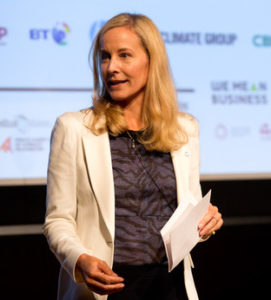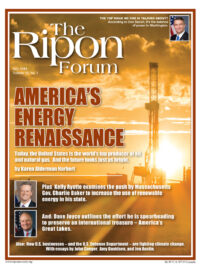
The U.S. administration’s announcement to leave the Paris Agreement ushered in a year that called into question the world’s ability to tackle climate change. It certainly made our mission at The Climate Group, to accelerate climate action to limit the warming of the planet to well under 2 degrees C (3.6 degrees F), look much more difficult to achieve.
But having worked over the past decade with businesses and state and regional governments to advance climate change solutions, I was not surprised to see that businesses and local governments have not stepped away, but in fact have stepped up.
We find ourselves facing a clean energy revolution, spurred not by politics, but by good business sense. And that changes everything.
We find ourselves facing a clean energy revolution, spurred not by politics, but by good business sense.
Technology has helped make the case for renewable energy, such as wind and solar, stronger than ever. Costs have fallen and companies are finding that their return on investment is too big to ignore.
T-Mobile recently announced its intention to source 100% renewable electricity by 2021, which is expected to save the company $100 million over 15 years.
General Motors has invested in wind energy to power all of GM’s manufacturing facilities in Ohio and Indiana, where the Chevy Cruze, Silverado and GMC’s light duty pickup trucks are built. GM currently saves $5 million each year by using renewable electricity and expects those savings to increase over time.
These are not the actions of companies just wanting to meet their corporate social responsibility goals. These are significant, long-term business decisions that completely rethink how electricity is sourced, distributed and used.
RE100, a corporate leadership initiative led by The Climate Group in partnership with CDP, aims to advance the shift to renewable energy globally. Companies in the commercial and industrial sector now account for two thirds of the world’s end-of-use electricity. RE100 has a growing list of 137 companies, operating in 122 countries with collective revenue of over $2.75 trillion. U.S. members account for one third and include companies as diverse as Apple, Mars, PG&E, Anheuser Busch, Goldman Sachs and Nike, all committed to 100% renewable electricity across their global operations. Together RE100 members are creating enough demand to power New York State annually.
In 2017, Starbucks committed to a long-term renewable electricity tariff to ensure its local facilities are powered by renewable electricity. The ‘Green Direct’ tariff will see the construction of a new wind farm in Washington State to provide clean electricity to 116 Starbucks stores, as well as the company’s Washington coffee roasting facility.
So why the sudden change? The biggest factor is risk. With price volatility in the energy market sensitive to so many factors, not least regulatory and geopolitical, renewables are something that should be a factor for America’s boardrooms. For Google, electricity costs at data centers are one of the largest components of its operating expenses. The long-term cost stability that renewable power provides give a level of protection against price swings in energy.
Climate risk to companies extends beyond price volatility; companies have global supply chains and a warming climate can cause a serious threat to business. Mars Inc. has seen both environmental and financial threats to its cocoa supply, a crucial ingredient of the beloved M&Ms. Rising temperatures and unpredictable rainfall will dramatically change where cocoa can be farmed, leading to a reduction in supply and an increase in price, hence why Mars already purchases the equivalent wind energy to power the production of all the M&Ms in the world.
Recruiting and retaining the best talent is another major challenge companies are facing. The Global Tolerance report found 62% of millennials want to work for a company “that makes a positive impact” and 53% work harder knowing their work makes a difference to the world. Companies that don’t integrate purpose, such as climate, into their business will struggle to keep up with those that do.
The private sector has shown it is prepared to innovate, especially since it is clear that pursuing renewable electricity is a sensible business decision. But significant as this may be, we are still on course for a warming planet. As a result, this all must be complemented with the actions of governments too.
T-Mobile recently announced its intention to source 100% renewable electricity by 2021, which is expected to save the company $100 million over 15 years.
Governments are also supporting this transition to renewables. Massachusetts has already awarded $20 million in grants for energy storage projects (which ameliorate the strain variable renewables can put on the grid), and hopes to add 200 MWh of storage capacity by 2020. Earlier this month, the state Senate unanimously approved a package of energy legislation that includes provisions setting a 100% renewable energy standard by 2047 and increasing the state’s energy storage mandate to 2 GW by 2025, enough to power 1.5 million homes a year.
This comes just weeks after Hawaii became the first state to require achieving carbon neutrality by 2045, in addition to its existing requirement of 100% renewable energy by 2045. States recognize support for renewable energy will become as significant an issue for political leaders as we are seeing in business.
The days of environmental stewardship being perceived as antithetical to business are ending. Increasingly, businesses recognize their long-term profitability relies on preventing the most catastrophic effects of climate change.
We need to amplify the actions companies and governments are taking to transition to a low carbon economy so there is a strong case for others to follow suit and not be left behind.
Amy Davidsen is Executive Director of the Climate Group, an international non-profit founded in 2004, with offices in London, New Delhi and New York.




